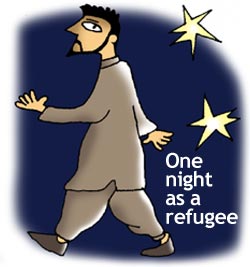
|
HOME |
NEWS |
REDIFF DIARY
|
Basharat Peer |
|
Last week I was assigned to report on the Afghans living in New Delhi. As I spoke to them, images of a night when I myself was a refugee flashed through my mind. It was almost a decade ago. The gun culture had already entered Kashmir and security forces used to conduct house-to-house searches almost on a daily basis. One evening, militants wielding Kalashnikovs took up positions on the rooftops of our neighbourhood to attack a convoy of government forces passing by. All we could do was grab our most prized possessions and run -- we could afford to be homeless, but not dead. Such temporary migrations used to occur in every Kashmiri locality. When militants opened fire, the security forces, alienated among a hostile population and operating under the threat of an unseen death, would go on the rampage. The results were never pretty -- so many civilians suspected to be militants killed, and the houses believed to have sheltered them burnt down. This was in the early days of the separatist militant movement. Kashmiris used to come out on the streets with freedom slogans. Militants were demigods then, and were expected to change things overnight. Things did change. But not the way Kashmiris wanted it. For every bullet the militants fired, security forces returned two. For every soldier injured, they killed one. And for every militant who roamed free, two innocents were detained. A beard and an able body was enough for the forces to arrest you. We knew that only too well. And that made us run faster to reach Numbul, the neighbouring village we considered safe at that particular moment. It lay across some paddy fields and a tributary of the River Jhelum. 'Desperate' is the only adjective I can use to describe that flight. We were half a kilometre from the river when the first bullet was fired. There was panic all around. Some tried running faster, others thought it prudent to lie flat in the fields. It was a time when nothing mattered but evading death. When even the most cultured of my neighbours was blurting expletives. Every 30 seconds or so, we heard a volley. It made us cringe. As we ran, my friend Dabloo said, "It's a different sound. Now the forces are hitting back. The militants seem to have stopped firing." The reaction he got for that comment was a tight slap on his rosy cheek from his normally calm father. The guns were still booming when we reached Numbul. Every door there was open to welcome us. I do not know whose house I rushed into. Huddled in the corner of a packed room, sipping tea, I broke down. I could not stop my tears. I was not just frightened for myself. I was worried about my father. It was around 6pm, the time my father usually returned home from work. What if he had already reached home? What if a mortar shell hit our house? What if his bus was caught in the crossfire? The guns fell silent some time later. But nobody dared return home. We stayed in Numbul that night, with kind strangers. None of us slept. There was too much fear and speculation about the number of casualties and houses burnt. The next morning we started back, anxious and edgy. As I rushed into our courtyard, I realised what the two-storeyed brick house meant to me. I had always taken it for granted. It had always been there. I could walk in and out any time. There wasn't any luxury in the house besides a black and white television set, a Japan-made radio that Daddy bought from Saudi Arabia, and my Polaroid camera. But it was home. And it was there, untouched! It was a huge relief to see my father standing there on the verandah. He had heard about the attack at his office and stayed the night at a friend's place. It was then, after the terror of that night, that I realised how precious normalcy was in our lives. The simple, middle-class existence, which I had taken for granted, seemed the greatest of all luxuries. "Do you think we will be able to return to Afghanistan?" Faridullah, an Afghan refugee, asked me. Over his shoulder, I saw photographs of better days in Afghanistan, of the family he last saw eight years ago. For a moment I thought of my own home in Kashmir.
"Very soon," I told him. "I hope you go home very soon."
Illustration: Uttam Ghosh Tell us what you think of this diary
|
||
HOME | NEWS | CRICKET | MONEY | SPORTS | MOVIES | CHAT | BROADBAND | TRAVEL ASTROLOGY | NEWSLINKS | BOOK SHOP | MUSIC SHOP | GIFT SHOP | HOTEL BOOKINGS AIR/RAIL | WEDDING | ROMANCE | WEATHER | WOMEN | E-CARDS | SEARCH HOMEPAGES | FREE MESSENGER | FREE EMAIL | CONTESTS | FEEDBACK |
||
